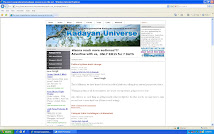Introduction
This article will delve into the challenges faced by Muslim Ummah in the context of political, social and economic perspectives. Let me emphasise here that the writer will refrain himself from discussing issues pertaining to Islamic faith per se, simply because I am not a qualified person to delve into the issue. I am a responsible Muslim and I would not like my opinion and perception about Islamic faith to mislead the readers particularly if it is something to do with the “akidah”, the most fundamental and the very basic of our Islamic faith.
Conflicts between people professing different beliefs are nothing new. They have occurred since time immemorial. Often however, the conflicts are not so much conflicts between followers of different faiths. Rather, they are conflicts between people of different ethnic groups, or people who have conflicting political and economic interests, who happen to be of different faiths. The differences in faith then become emphasised, and are used by the conflicting parties in different ways to serve their objectives and interests.
We can recall many such examples in history as well as in contemporary times. The Reconquista between Christians and Muslims that was waged over eight centuries revolved around territory although religion distinguished the two sides. More recent examples include the conflict involving Muslims, Roman Catholics and Serbian Orthodox in Bosnia-Herzegovena; Russian Orthodox Christians and Muslims in Chechnya; Jews, Muslims and Christians in Palestine; mostly Hindus and Muslims in Kashmir; Muslims and Buddhists in southern Thailand; Muslims and Catholics in southern Philippines; Muslims and Christians in Indonesia’s Ambon and Halmahera provinces; and Christians and Muslims in the former East Timor.
Sometimes the conflict is between people who are within the same family of religion, such as between Sunni and Shi’a in Iraq and Pakistan.
Political, economic and ethnic factors have also driven people of the same faith to fight each other. In fact, the bloodiest war and conflict of this nature was fought between Muslims in the case of Iraq and Iran.
But my focus in this article is on the prevailing tensions between the West and the Muslim world which in my personal opinion is the root cause of the challenges faced by the Muslim world today.
Extremism and radicalism has indeed become the scourge in many parts of the world today. Terrorist attacks against Western targets perpetrated by groups in the name of Islam since September 11 has also triggered strong suspicion and distrust of Muslim minorities living in Western countries. There is now perceptible intolerance and antipathy towards Muslims driven by a new wave of Islamophobia.
Islamophobia must be removed and the international community must take a stand to stop actions which contribute, directly or indirectly, to the perpetuation of injustice, oppression or aggression against Muslim countries and the Muslim ummah anywhere and everywhere.
The international community has a clear duty to disallow the marginalization of Muslims and instead enable them to take part in influencing and setting the international agenda. The increasing gap and misunderstanding between the West and the Muslim world must be bridged. But it requires both sides to work in tandem to close the chasm.
Perhaps the worst manifestation of this religious dimension of the tensions between the West and the Muslim world was the controversy over the caricatures of the Prophet Muhammad (p.b.u.h). Already alienated by a host of other perceived injustices, the Muslim world closed ranks and erupted in anger, because pictorial depictions of the prophets of Islam, including Moses and Jesus, are prohibited by the religion. Associating a bomb denoting terrorism with the revered Prophet Muhammad (p.b.u.h) incensed Muslims around the globe.
I must say, the main objective of this article at the end of the day is to provide sufficient information and understanding on the dynamics of the global challenges faced by Muslim ummah, hence in a small way would assist the readers to appreciate Islam Hadhari in its true meaning and perspective as the driving force to achieve peace, security and political stability in the Muslim world.
To be continued…….
Subscribe to:
Post Comments (Atom)



























No comments:
Post a Comment